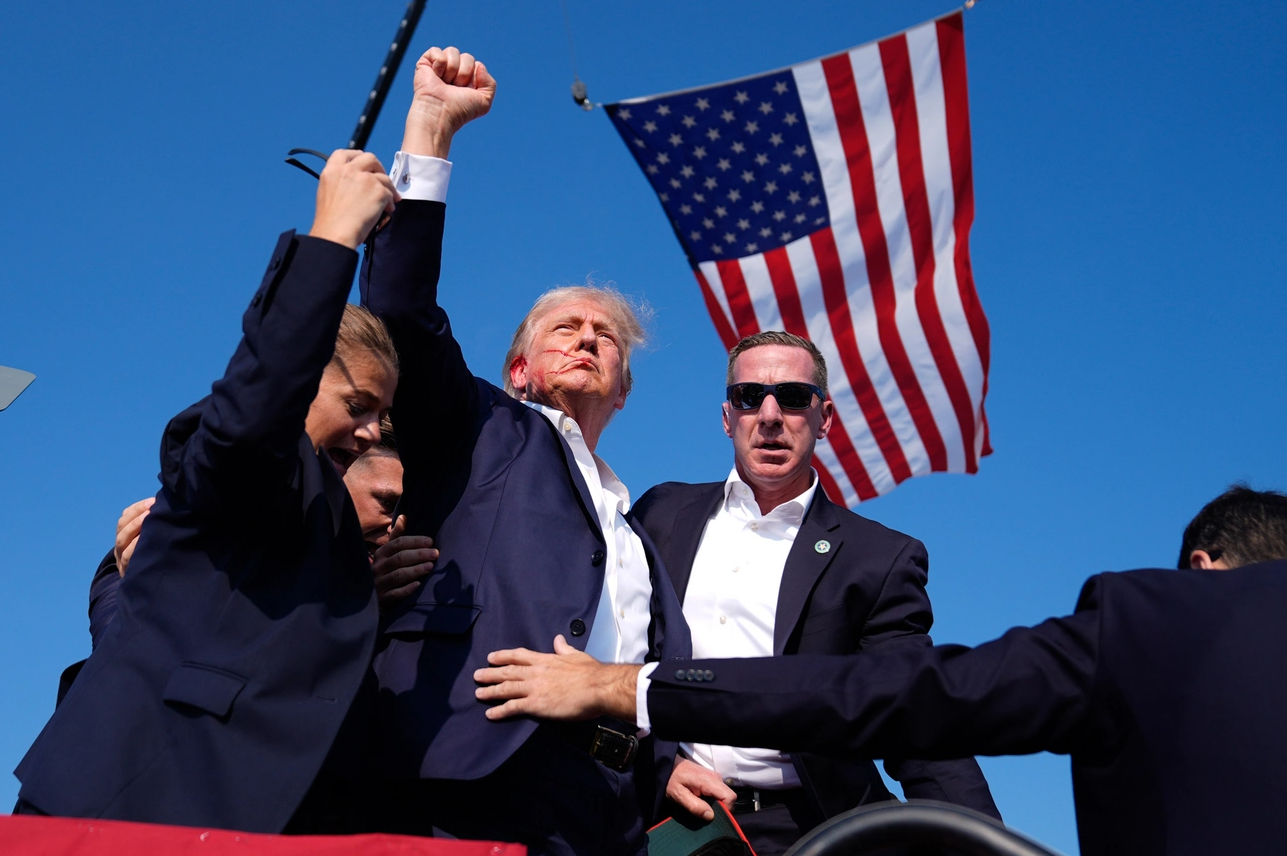
Former President Donald Trump is surrounded by Secret Service agents at a campaign rally July 13, 2024, in Butler, Pennsylvania. ( Evan Vucci/AP)
Can an assassination attempt improve a candidate’s chances of winning an election? Taiwan’s experience suggests that it might. During its 2004 presidential election, polls showed then-President Chen Shui-bian trailing his opponent, Nationalist Party (Kuomintang) candidate Lien Chan. But this changed abruptly the day before the vote, when Chen and Vice President Annette Lu were shot during an election rally.
Of the two shots fired, one grazed Chen’s abdomen, while the other hit a cast on Lu’s knee. These relatively minor injuries led to widespread speculation that the attack was staged to generate sympathy for Chen, who vehemently denied any such plot.
The next day, Chen won the election by a razor-thin margin of 0.25%. Given this unexpected and narrow victory, it is widely believed that the assassination attempt swung the election in Chen’s favor.
While the shooter was not arrested at the scene or even seen by other rally attendees – owing to loud firecrackers that masked the sound of the gunshots – he was later identified as Chen Yi-hsiung, a retired construction worker who supposedly committed suicide by drowning before police could arrest him. The alleged assassin reportedly left a suicide note that presumably outlined his motives, but his family supposedly burned the note before anyone else could read it.
The circumstances surrounding the assassin’s death reinforced suspicion that the assassination attempt had been staged. While a subsequent investigation by the Chinese-American forensic expert Henry Lee confirmed that Chen’s abdominal injury was caused by a gunshot, an examination of the bullet found in Chen’s clothing suggested that the gun had been altered, with the bullet designed to have a weak impact. Consequently, Lee concluded that the shooter did not mean to kill Chen.
Taiwanese authorities cited Lee’s investigation as evidence that Chen and Lu were hit by real gunshots but ignored his finding about the weak bullet. Meanwhile, those who believed that the assassination attempt was staged viewed Lee’s conclusion as confirmation. Curiously, the gun itself has never been found.
Chen’s unexpected victory suggests that the attempted assassination of Donald Trump could raise the chance of his victory in November’s election. One does not need to be a political insider to predict that the Republican Party will try to leverage the shooting to bolster support for Trump and down-ballot Republicans.
While some details are still foggy, the shooter has been identified as a 20-year-old registered Republican who, armed with an AR-15-style rifle, killed one bystander and seriously injured two others before being killed by a Secret Service sniper. Trump, despite having his face and right ear bloodied, appeared to suffer no serious injuries.
Immediately after the shooting, social media platforms were inundated with conspiracy theories claiming the shooter was working for the Democratic Party, China, Hamas, or illegal immigrants. Republican Representative Mike Collins claimed that US President Joe Biden was behind the assassination attempt, posting on X that “Joe Biden sent the orders.” Meanwhile, others have insisted that the shooting was staged. The torrent of rumor and disinformation is unlikely to subside before November.
The big question is whether the shooting will lead to a Trump victory. As Chen’s experience shows, an assassination attempt can be politically advantageous. But with four months to go before the election, the impact may be less significant than many expect. The memory of the incident could be overshadowed by other events, or it might have the opposite effect, with American voters blaming Trump for fanning the flames of political violence.
But it is more likely that the shooting will benefit Trump. The tendency of many voters to cast sympathy votes suggests they may prioritize issues they find easier to understand over complex ones that may prove more consequential in the long run. While “Biden is too old” is simple and straightforward, and “Trump took a bullet for us” is easy to understand, “Trump and Biden’s tariffs are bad for American households and firms” is a more nuanced argument that requires some understanding of economic policy.
Given this reality, Democrats face a formidable challenge. It is difficult to imagine the Chen Shui-bian effect not working in Trump’s favor, especially since Trump was already leading Biden in most polls, both nationally and in many battleground states. Barring a dramatic change, such as an open Democratic National Convention in August that produces a more dynamic presidential nominee than Biden, the party’s electoral prospects have just become dimmer.
Copyright: Project Syndicate, 2024.
www.project-syndicate.org